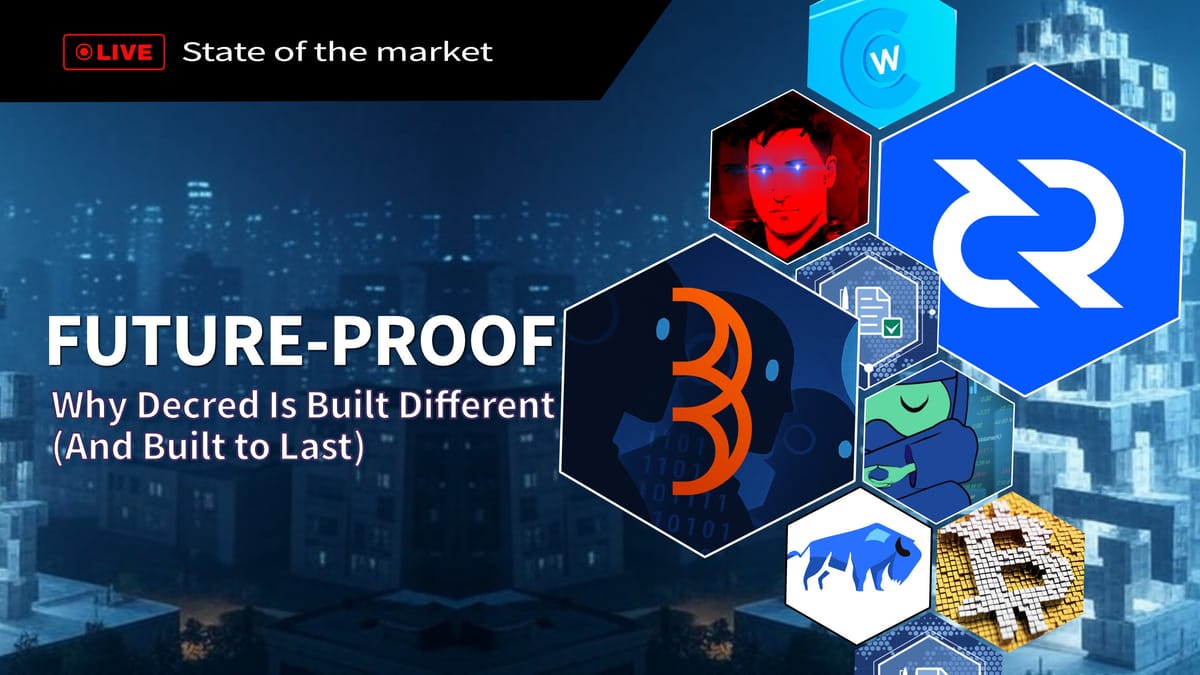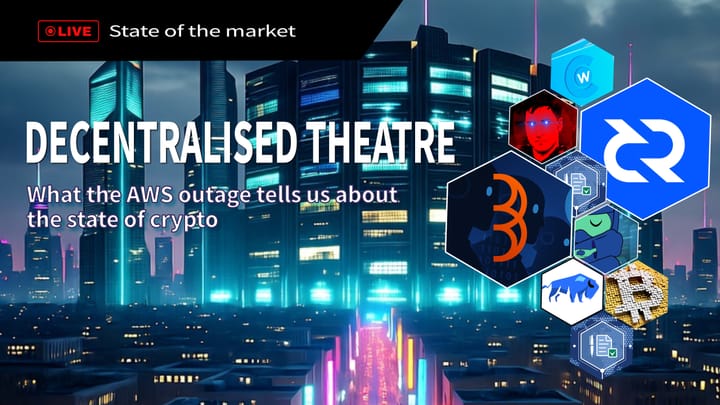Future-Proof Crypto- Why Decred Is Built Different (And Built to Last)
exploring the innovative thinking and development philosophy that has shaped this unique cryptocurrency project

LISTEN TO THE PODCAST:
Welcome to "Decred and the State of the Market," brought to you by Exitus and PhoenixGreen. In this episode, we’ll dive into Decred's strategic positioning and long-term vision, exploring the innovative thinking and development philosophy that has shaped this unique cryptocurrency project.
Livestream Agenda:
- Stablecoin summer
- Biggest leak ever: 16B logins & passwords exposed - https://x.com/VivvekShukla/status/1935762735813283999
- Dave C on why Decred - https://x.com/realdavecgh/status/1930497471613940185
Discussion Q&A:
Discussion Points:
- a fair launch, community-driven development and innovation, treasury for development (10% of miners rewards)
- A Fair launch vs Tail emission
- Low PoW miner rewards risk reducing network security...
- PoS ticket voting and Politeia governance favours wealthier and more active stakeholders
- Limited mobile functionality
- Privacy features are limited compared to dedicated privacy coins ( Considerations: inflation prevention, ease in changing the cryptographic primitives, and long-term pruning)
- Contributors and community face barriers due to the complexity of the protocol
- the hybrid consensus POW / POS just makes everything super complicated and potentially vulnerable to hacks and bugs
Q: Does Decred's low PoW miner rewards reduce network security?
A: This is mathematically incorrect for Decred due to its hybrid PoW/PoS system. While this would be true for pure PoW systems, Decred's hybrid consensus provides 10x-100x stronger security against 51% attacks compared to pure PoW.
Additionally, with roughly 80% of the total coin supply already distributed, external attacks are no longer feasible. An attacker would need to convince existing stakeholders to sell their coins, which would:
- Take extended time (average 28 days per staking ticket)
- Significantly raise attack costs due to increased acquisition prices
Q: Doesn't the PoS ticket voting system unfairly favour wealthy stakeholders?
A: Yes, and this is intentional by design. People with more skin in the game have more influence - this is true for all governance models, including:
- Centralised authorities (developer councils, benevolent dictators)
- Pure PoW systems (wealthier individuals can acquire more hash power)
The key difference is that Decred makes this influence transparent and verifiable through cryptographic proof, rather than hiding it behind closed doors like other systems. You can see every vote on consensus changes, Politeia proposals, and Treasury spends with mathematical certainty.
Q: Are Decred's privacy features inferior to dedicated privacy coins?
A: This oversimplifies the technical tradeoffs involved. Neither Monero's RingCT nor Decred's StakeShuffle is objectively superior - they make different compromises:
Monero's RingCT:
- ✅ Default privacy (easier user experience)
- ❌ Potential for undetectable inflation
- ❌ Requires specialised knowledge to modify
- ❌ Cannot achieve true full pruning
Decred's StakeShuffle:
- ✅ Inflation prevention (perfectly binding commitments)
- ✅ Quantum-resistant cryptography
- ✅ Easy to update cryptographic primitives
- ✅ Enables full UTXO pruning
- ❌ Opt-in system (requires user action)
For Decred, undetected inflation would be disastrous since governance is tied to coin ownership, making inflation prevention critical.
Q: Is the hybrid PoW/PoS system overly complicated and vulnerable?
A: Strongly disagree. The hybrid consensus consists of straightforward code implementing tickets, voting, and a lottery system - something any junior software engineer can read and understand.
Compare this to systems like Monero's RingCT, which requires deep expertise in cryptography and advanced mathematics to truly understand and review.
Track Record: Decred launched in February 2016 (9+ years ago) and has never had exploitable vulnerabilities found in its hybrid system, despite:
- Multiple security reviews
- Controversial consensus changes voted on by stakeholders
- Various social engineering attempts
- Active incentives for powerful entities to find exploits
Q: What about mobile functionality limitations?
A: This is the most fair criticism. While Decred works on multi-coin wallets like Cake and Exodus, options for advanced governance features on mobile are limited.
However, there's a security tradeoff here - mobile devices are objectively less secure than properly configured desktops, mini PCs, or Raspberry Pis. Security-conscious stakeholders who participate in governance typically prefer these more secure, non-mobile options.
Q: Why is the analysis being criticised as superficial?
A: The original thread made broad claims without specific examples:
- Mentioned "potential weaknesses" without identifying what they are
- Used generic language like "potentially vulnerable to hacks and bugs" that could apply to any system
- Failed to acknowledge the fundamental tradeoffs present in all cryptocurrency technologies
A proper analysis should examine specific technical details, provide balanced discussion of actual strengths and weaknesses, and acknowledge that there's no single "correct" approach - only different sets of tradeoffs.
Note: This response emphasises that the cryptocurrency space often falls into the trap of assuming there's only one true way to solve problems, while ignoring the inherent tradeoffs that exist in all technological approaches.





Comments ()